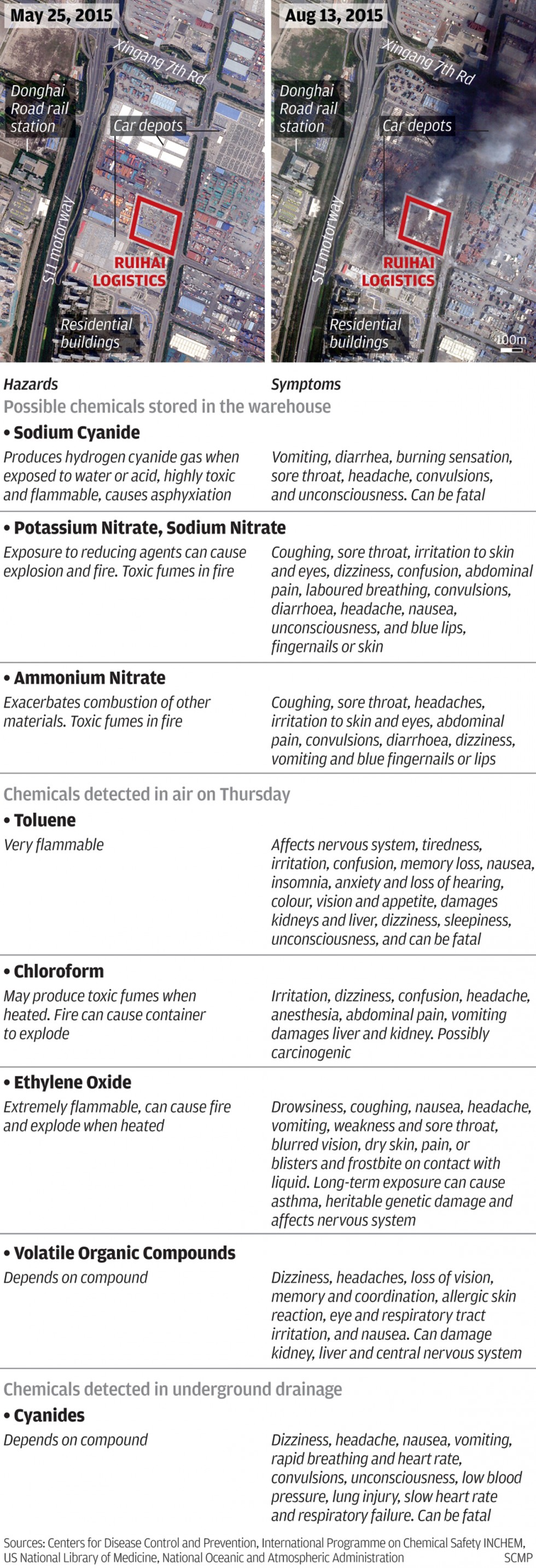You are using an out of date browser. It may not display this or other websites correctly.
You should upgrade or use an alternative browser.
You should upgrade or use an alternative browser.
Massive explosion rocks Chinese city
- Thread starter Strafe
- Start date
Chemical levels above safe limit at site of Tianjin warehouse explosion
PUBLISHED : Sunday, 16 August, 2015, 1:12am
UPDATED : Sunday, 16 August, 2015, 1:23am
Nectar Gan and Keira Lu Huang in Tianjin

Firefighters work at the site of the explosions on Saturday. Photo: AFP
Firefighters continued to battle flash fires in Tianjin late Saturday night, three days after two massive explosions rocked one of mainland China’s biggest port claiming the lives of at least 104 people.
Chemical experts have also located amounts of potentially deadly sodium cyanide scattered across the blast site, which they believe came from a stockpile of 700 tonnes of the toxic chemical stored in the warehouse at the epicentre of last week’s blasts.
A report in the official Science and Technology Daily said the chemical had been scattered by the blasts, but the exact size of the warehouse’s stockpile had not been confirmed by the government.
Of the 722 people injured in the explosions, 58 remained in a critical condition heading into Sunday morning. It is unclear how many people are still missing or unaccounted for.
Two more survivors were pulled from the ruins on Saturday, one of them identified by state media as Han Fengqun. There were no details about the second.
Tianjin fire chief Zhou Tian said that due to the long working hours, some firefighters suffered chest pain and felt weak.
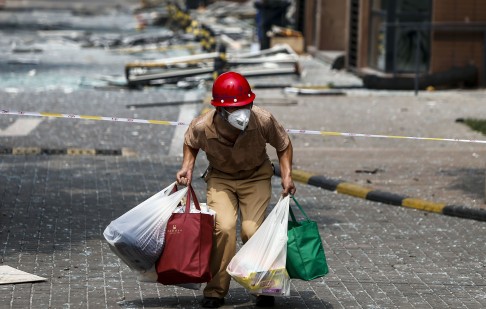
A man carrying his belongings walks out of his home in a residential area near the site of the explosions in Tianjin on Saturday. Photo: AFP
Ruins strewn across the port’s warehouse area burst into flames several times Saturday morning, sending thick plumes of smoke into the sky. By evening, the flames had been put out, but columns of smoke continued to rise above the shipping container littered blast site.
The new fires led the authorities to order residents who had taken refuge in a school near the blast site to be evacuated after a change in wind direction sparked fears of toxic poisoning, Xinhua reported.
Other reports said people within 3 kilometres of ground zero were ordered to evacuate, but this was later denied at a press conference held by the authorities.
By the early hours of this morning, two of the 17 air-monitoring stations around the blast site had recorded amounts of the highly poisonous hydrogen cyanide exceeding safety limits for a short period, Tianjin’s environmental protection chief Wen Wurui told state broadcaster CCTV.
One station was 0.04 times over the limit, the other 0.5 times higher. Wen said coming into contact with the substance in a short period of time would not have an obvious effect on the human body.
Hydrogen cyanide can be released by sodium cyanide, a highly toxic substance which can kill rapidly if inhaled when it dissolves or is burnt.
News website Thepaper.cn reported the sodium cyanide at the blast site was from the Hebei Chengxin in neighbouring Hebei province, citing several workers at the company, who claimed it is one of largest producers of sodium cyanide in China.
The workers said the company’s owner and managers hadgone to Tianjin to help deal with the substance, the report said.
President Xi Jinping said recent work safety accidents had exposed severe problems in the mainland’s production safety.
Premier Li Keqiang urged state departments and local governments to check for potential safety hazards.
Survivor pulled from shipping container 62 hours after blasts rock Chinese city of Tianjin, as death toll rises to 104
PUBLISHED : Sunday, 16 August, 2015, 12:07am
UPDATED : Sunday, 16 August, 2015, 1:09am
Celine Sun
[email protected]

Han Fengqun, 56, was found in a shipping container 50 metres from the centre of the blast area. Photo: SCMP Pictures
Rescuers made a miracle find on Saturday afternoon by pulling a survivor from the wreckage of the twin blasts at a Tianjin dangerous goods warehouse, on the same as more blasts rattled the site.
The man was discovered nearly three days after the massive explosions as the death toll crept up to 104 before midnight, state media reported.
Han Fengqun, 56, was found at 2pm in a shipping container 50 metres from the centre of the blast area, according to state broadcaster CCTV.
He was found by troops trained in chemical defence and warfare under a pile of shipping containers that had been buckled by the force of the blasts on Wednesday night.
They had been searching through the containers by torchlight before they found him, the report said.
He was still conscious and able to say a few words before he was taken to a military hospital.
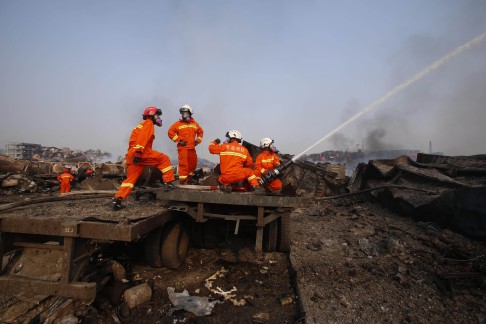
Firefighters work at the site of the explosions in Tianjin on Saturday. Photo: AFP
China News Service reported he was in critical condition and suffering from severe dehydration and respiratory failure. Doctors earlier said he had suffered burns to his throat and lungs, plus several fractures to his body.
Han comes from Henan province and had been running a grocery business in the city’s port for two years.
State television said he had spoken to his family by phone on Wednesday night before the blasts and then went missing.
The chemical defence force of the Beijing garrison started their search at noon after receiving a report that another resident, an employee working for a logistics company at the port, was still missing.
A team of 70 chemical warfare troops searched the area looking for survivors, Xinhua said.
A 19-year-old firefighter, Zhou Ti, was found alive near the centre of the blasts on Friday morning. He was among the first firefighters to reach the scene on Wednesday night.
He suffered burns to his face and eyes as well as fractured ribs, state media reported.
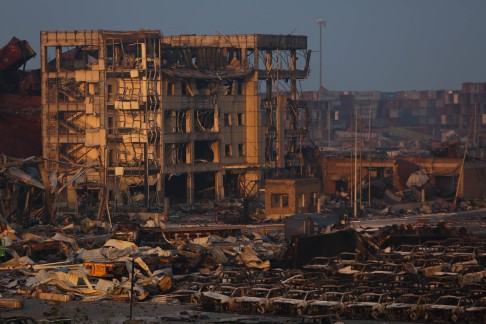
Photo taken on Saturday shows a scene of the warehouse explosion site in Tianjin. Photo: Xinhua
Meanwhile, as new explosions rocked the site on Saturday, some residents were told to stay indoors or voluntarily left temporary shelters due to changes in the wind direction, amid lingering concerns about a chemical contamination in the industrial zone.
Despite rumours and news reports that an evacuation had been enacted for a radius of up to 3 kilometres, a government official in Tianjin denied that this was the case.
Seven or eight fresh blasts caused new fires to break out at the facility in the port city, the state news agency Xinhua reported. It did not give details about the scale of the latest explosions.
As the list of casualties count continued to grow, the Pope offered prayers in Rome for the victims and their families.
"Those who have lost their lives as well as all those touched by this catastrophe are in my prayers," Pope Francis said during angelus prayers at St Peter's in Rome during the Catholic Feast of the Assumption, which marks Christ's mother Mary's ascent to heaven.
Starting from 11am, police and volunteers with loudspeakers were telling Tianjin residents to start evacuating the danger zone, The Beijing News reported on its news website.
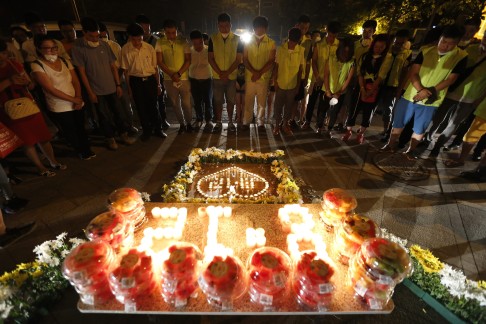
Local people pray for victims as they lay flowers and light candles outside Taida hospital in Tianjin. Photo: EPA
However, some residents had reportedly returned later in the day after the wind direction changed again.
Police blocked Donghai Road, the main road leading to the blast zone. At the same, teams in vehicles were seen clearing paths for rescue efforts.
Thirteen firefighters and an unknown number of port workers were still missing, Xinhua reported.
One firefighter was rescued from the ruins of the warehouse early Friday morning.
The disaster started when two explosions with a combined force of 24 tonnes of TNT ripped through the industrial Binhai New Area, burning everything in its path and damaging infrastructure up to 1 kilometre away, including surround apartment blocks.
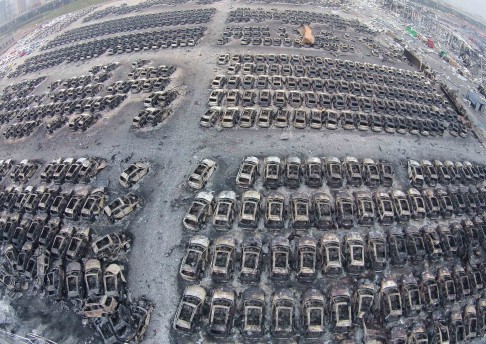
The charred remains of new cars at the site of the warehouse explosion. Photo: Xinhua
At least 721 people were injured when explosions and a fireball hit the warehouse late Wednesday. Twenty-five were critically wounded and another 33 were in a serious condition, Xinhua said.
More than 1,000 rescuers were proceeding slowly in uncertain conditions where unidentified hazardous substances triggered the explosion, authorities said.
Armed police were carrying out the evacuation after highly poisonous sodium cyanide was found at the site, The Beijing News said, as the blaze intensified dramatically, with several blasts reportedly heard.
“Out of consideration for toxic substances spreading, the masses nearby have been asked to evacuate,” Xinhua said.
Officials said earlier that specialists from sodium cyanide producers were being sent in to the hazardous goods storage facility where giant explosions days earlier sent a huge fireball soaring into the sky and left a vast radius of destruction.
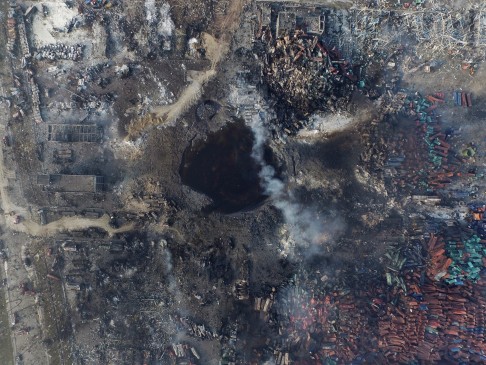
An aerial view of a large hole in the ground in the aftermath of a huge explosion that rocked the port city. Photo: EPA
Authorities have struggled to control the resulting days-long blaze and identify the substances present at the scene, sparking fears among locals.
Furious residents and victims’ relatives railed against officials outside a news conference for keeping them in the dark as criticism over a lack of transparency mounted. There were 21 firefighters among the dead, authorities said.
They were prevented from entering the briefing and could be heard shouting outside.
“Nobody has told us anything, we’re in the dark, there is no news at all,” screamed one middle-aged woman, as she was dragged away by security personnel.
Officials said they were unable to identify precisely what chemicals were at the site at the time.
At the news conference, Tianjin work safety official Gao Huaiyou listed a host of possible substances, adding that recent large exports that passed through the site had included sodium bisulfide, magnesium, sodium, potassium nitrate, ammonium nitrate, and sodium cyanide, among others.
“We believe there should still be a lot stored at the terminal areas,” he said.
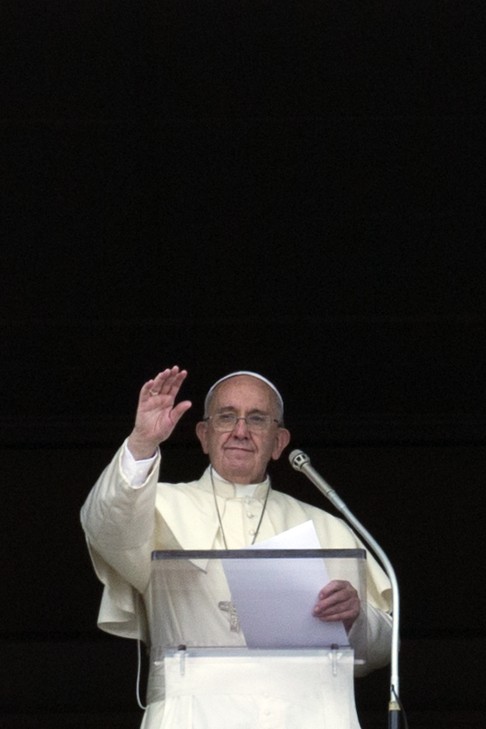
Pope Francis delivers a blessing from the window of his studio overlooking St.Peter's Square in Rome on Saturday during the Angelus noon prayer at the Vatican. He also gave his condolences to the victims in Tianjin. Photo: AP
Personnel from sodium cyanide producers had been called in “because they are experts on the chemical’s nature and the ways to deal with it”, he added.
A sewage pipe where the chemical had reportedly been detected had been sealed off, he said.
More than 200 nuclear and biochemical experts from the Chinese military were deployed to Tianjin, which has a population of 15 million, on Thursday.
Concerns about the chemical cocktail also raised questions over whether firefighters responding to an initial blaze at the warehouse could have contributed to the detonations by spraying water over substances that react explosively to it.
One senior official insisted firefighters had followed the proper procedures, but noted that they were unaware of the precise chemicals present when they arrived.
“It is not clear whether a chemical reaction occurred,” said Lei Jinde, the head of the firefighting department at Tianjin’s public security bureau.
“We knew there was calcium carbide, but we don’t know whether the calcium carbide exploded and caught fire,” he said in an interview published by Xinhua. “It is not that the firefighters were fools ... No, it is not that.”
Lei said that the facility was listed as holding ammonium nitrate and potassium nitrate, as well as calcium carbide.
State newspaper The People’s Daily said earlier that the facility’s construction “clearly violated” safety rules.
Under Chinese regulations, warehouses stocking dangerous materials must be at least one kilometre away from surrounding public buildings and main roads, it said, but there were two residential compounds and several main roads within that distance.
'700 tonnes' of sodium cyanide reportedly in warehouse during deadly Tianjin blasts
Chinese officials investigate claims of sodium cyanide 70 times more than the permitted amount stored at Ruihai site
PUBLISHED : Sunday, 16 August, 2015, 4:22am
UPDATED : Sunday, 16 August, 2015, 4:22am
Nectar Gan
[email protected]

An aerial view of the crater after Wednesday's blasts. Photo: EPA
A large discrepancy over the precise quantity of hazardous chemicals being stored at a warehouse in the port area of Tianjin at the time of Wednesday night's two deadly blasts is just one of the many unanswered questions surrounding the tragedy, which has claimed at least 85 lives.
Southern Metropolis News has reported that 700 tonnes of sodium cyanide - a highly toxic substance that can kill rapidly if inhaled - were being stored the warehouse owned by Ruihai International Logistics, according to a claim by the owner of a Hebei chemical company that owned the substance - 70 times the permitted amount.
Yet a report by the government's environmental inspectors in 2014 noted that Ruihai was permitted to temporarily store up to 10 tonnes of sodium cyanide.
Two blasts ripped through an industrial area of the port at about 11.30pm on Wednesday - the first smaller blast was equivalent to three tonnes of TNT detonating - followed by a larger second blast about 30 seconds later, equivalent to 21 tonnes of TNT detonating.
An official at Tianjin's work safety watchdog told a press conference yesterday that it was likely sodium cyanide and many other hazardous chemicals, had been stored at the warehouse, but provided no further details.
However, as of late last night, Ruihai had made no public statement regarding the explosions at its warehouse; neither had it released the names or quantity of hazardous chemicals that had been stored there.
Zhi Feng, the company's general manager, remains in Tianjin's Teda Hospital, after suffering head injuries as a result of the blasts.
A doctor told Prism, Tencent media group's financial news outlet, that Zhi was now conscious and had been moved out of intensive care into a general ward. He has been accompanied by family members and is being guarded by police around the clock. Many journalists have tried to contact him, but without success.
An unnamed official at Tianjin's environmental protection bureau said he was shocked by the claim that Ruihai might have been storing 700 tonnes of sodium cyanide in the warehouse at the time of the blast.
The company would have been breaking the law if such a quantity was correct.
"Either that figure of 700 tonnes - which has yet to be verified, is untrue - or that company if facing serious allegations," the official told the Southern Metropolis News.
"If 700 tonnes of [sodium cyanide] were being stored, this would have been 70 times more than the permitted amount," the official was quoted as saying.
At a press conference on Thursday, Gao Huaiyou, deputy director of Tianjin's work safety watchdog, said there were "large discrepancies" between the amount of chemicals Ruihai's manager claimed it was storing in the warehouse and the figure obtained from customs officials.
The Beijing News questioned whether the discrepancy meant Ruihai might have been involved in smuggling dangerous chemicals.
The company has made no public statement in response to such claims.
Members of the public also questioned how the privately owned Ruihai had obtain licences to store such hazardous chemicals near residential areas.
Fears of deadly cyanide gas reaction as rain forecast for Tianjin
City's vice-mayor admits the chemical has spread 1km from blast site, amid concerns it will react with rain to produce deadly compound
PUBLISHED : Monday, 17 August, 2015, 11:40pm
UPDATED : Monday, 17 August, 2015, 11:54pm
Li Jing and Keira Lu Huang in Tianjin

Thousands of wrecked cars and containers litter the blast site in Tianjin, where officials are involved in a desperate search for spilled sodium cyanide. Photo: KY Cheng
The explosions in Tianjin last week scattered sodium cyanide as far as 1km from the blast site, the city's vice-mayor admitted on Monday, as fears rose that rain forecast over the next few days could react with the chemical to release highly poisonous hydrogen cyanide gas.
Making his first public appearance since Wednesday's blasts, He Shushan, who is in charge of work safety in the city, explained his absence as due to a desperate attempt to search for and remove the chemical over the past few days.
He played down fears over its presence, saying that military specialists and government staff had twice scoured a 1km radius from the centre of the blast.
The death toll from the disaster rose to 114 on Monday, with 70 still missing, most of them "contract firefighters".
The relatives of some victims said they had been grounded in hotels, to prevent protests.
Authorities have been tight-lipped about the presence of sodium cyanide at the site. The first official confirmation of its existence there came from a Beijing military official on Sunday.
He's comments suggest city authorities knew of its presence at an earlier stage.
But the public received no official warnings about the chemical, and many residents and journalists have since accessed the 1km radius around the site.
Read more: What are the dangers of sodium cyanide?
Liu Hua, a Greenpeace campaigner, said: "It is really a pity the government did not inform or alert the public about the spill immediately. Sodium cyanide is a lethal chemical and could do huge damage to the health of those exposed to it."
The chemical can prove fatal if inhaled.
He said authorities had cleared a 2km radius from the blast centre, and as a precaution, a search of the 3km radius was to finish by last night.
Chemicals spilled at the blast zone's centre - about 10 hectares - would be the most difficult to decontaminate, said He, as some had entered the cracks of thousands of wrecked containers.
Several hundred tonnes of sodium cyanide were housed in the vicinity of the blast. But a military specialist said only a "relatively small amount" had been spilled. The rest had been located, but not yet retrieved.
Bao Jingling, a chief engineer at Tianjin's environmental protection bureau, said hydrogen cyanide in the atmosphere had been 8 per cent above safe levels at one point on Sunday at one of 17 monitoring stations, but no one was nearby to be harmed.
Bao said there was a plan to contain the spread of hydrogen cyanide if rain were to fall.
A temporary enclosure has been built around the core blast zone to prevent leakage of polluted water.
But Liu had other fears.
"Sodium cyanide is not the only dangerous chemical at the blast site. It is almost impossible to predict what the rainwater will wash away as chemicals may react with each other. If there is any leakage outside the [temporary enclosure], chances are high the polluted water will end up in Bohai Bay," he said.
"As there is still no information on exactly what types and quantities of chemicals went up in the explosion, there is no way to gauge the scale of the environmental impact - how far it'll reach and how long it'll last."
Visiting the dead heart of Tianjin's catastrophe
PUBLISHED : Monday, 17 August, 2015, 11:56pm
UPDATED : Tuesday, 18 August, 2015, 12:02am
Keira Lu Huang in Tianjin
[email protected]

SCMP reporter Keira Lu Huang visits the Tianjin blast site. Photo: KY Cheng
It was hard to get a true sense of the deadly blasts in Tianjin until I set foot in ground zero.
Early Monday afternoon, the local government sent six Toyota Coaster buses to drive journalists to the heavily guarded blast zone for the first time. It was the opportunity we'd been waiting for, although many of us had sneaked into the area before.
"We always planned to bring you here. Today it's just the right time," a local official said.
Perhaps the sight of Premier Li Keqiang visiting the site without protective gear on Sunday had reassured people.
We got out at the four-lane Haibin Avenue next to the blast scene at around 3pm. Dead - that was my first reaction. It felt dead. The only sound I could hear was from excavators.
Containers, once neatly stacked, were scattered, burned and twisted, as if a giant angry boy had smashed his toy blocks. They were in the creek near the highway, on top of cars - themselves just gutted skeletons of vehicles - and other places where they didn't belong. That was as vivid an image as any showing the strength of the blasts.
Almost seven days after the explosions, black smoke still seeped from a pile of containers.
Read more: Fears of deadly cyanide gas reaction as rain forecast for Tianjin
But what caught my eye was the big hole in the middle of those containers. That was where the warehouse once was. The hole, more accurately, was a pond.
I asked officials, police and military officers at the scene whether the water was left when firefighters first tried to put out the blaze. The question was met with either silence or "I don't know".
It has been widely reported that the water from firehoses triggered the blast.
In the past week, I have talked to dozens of families of missing firefighters, injured people and desperate homeowners. But it was only after I went to the blast scene, seeing the ruins of the fire department, the tangled window frames outside blocks of flats and damaged cars, that those stories started to sink in.
The worst damage stretches along the avenue for more than 300 metres.
As the wind's direction changed, I smelled not only things burning but also a peculiar odour, like something from a chemistry lab.
The stinging in my eyes and throat that I felt on the first two days in Tianjin came back after this visit, even though I was wearing a mask. I thought those symptoms were due to my tiredness. Now I blame it on the air.
‘There’ll be no cover-up over Tianjin blasts’, Communist Party reassures as death toll rises to 114
PUBLISHED : Monday, 17 August, 2015, 11:35am
UPDATED : Monday, 17 August, 2015, 7:00pm
Li Jing and Keira Lu Huang

Rescue are working around the clock to clear chemicals from the blasts in Tianjin. Photo: K.Y. Cheng
The Communist Party’s official newspaper in China has sought to reassure the public that there will be no cover-up over the causes of the massive explosions at a dangerous goods warehouse in Tianjin as the number of people known to have died in the disaster rose to 114.
People's Daily said in an editorial there was no doubt that the central government would carry out a thorough investigation into the blasts last Wednesday and that anybody guilty of wrongdoing would be held to account.
The article was published amid intense speculation about the owners of the warehouse, Ruihai International Logistics, and whether any government officials were linked to the firm.
It was groundless for the public to assume there would be a cover-up in the investigation as the Communist Party has taken down several “tigers”, senior officials guilty of corruption, the newspaper said.
“[The central government] has pursued Zhou Yongkang, Xu Caihou, Guo Boxiong and Ling Jihua. Why should [the government] cover up anything over a safety accident? It is groundless to doubt that any officials would be protected.” the article said, naming several senior officials detained for graft.
The newspaper called for the public to trust the central government, but added that the investigation was complex and unlikely to reach any swift conclusions.
“Rescuers, journalists and chemical experts all admit that the situation at the blast site is highly complicated. Burning and explosions tend to destroy the clues for investigation making it extremely difficult to find the cause of the explosion and the investigation could take a very long time,” the commentary said.
The public should have patience and trust in the authorities, but government departments should also release information in a timely manner to prevent the spread of rumours, the newspaper said.
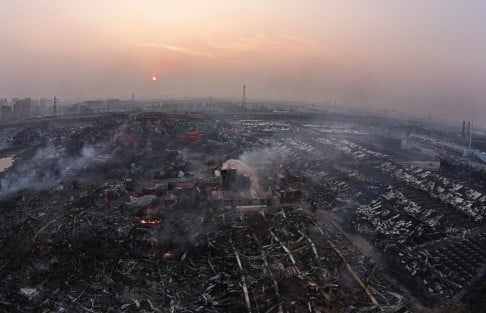
An aerial view showing the devastation in the blast area. Photo: Xinhua
A small explosion was reported at the blast site early on Monday morning.
Fifty-four of the people confirmed dead have been identified, including 16 fireman hired by the Ministry of Public Security, 23 firefighters employed by the port and five police officers.
Seventy people are still missing. Fifty-six are firemen hired by Tianjin port and eight firefighters employed by the police authorties.
Some 698 people are receiving treatment in hospital.
More than 50 homeowners who live near the blasts site held a protest on Monday morning outside the venue for a press conference on relief efforts in the disaster.
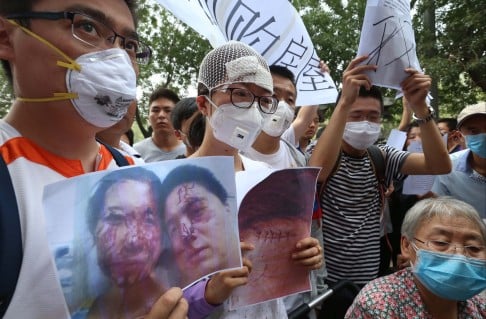
Homeowners stage a protest outside a press conference updating reporters on relief work in Tianjin. Photo: SCMP Pictures
They called for the government to buy their homes that had been destroyed or badly damaged in the explosions.
They shouted, “We want the truth!” and held banners saying, “We love the party and the government, please buy back our apartments”.
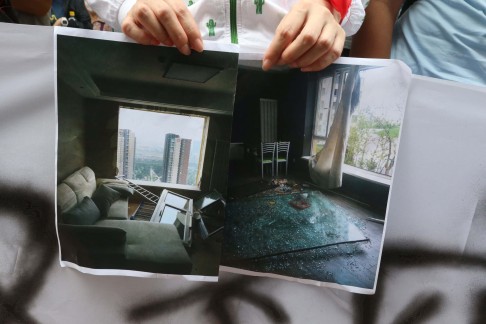
A protester shows pictures of the damage to their home. Photo: SCMP Pictures
Many protesters vowed to take legal action against the owner of the dangerous goods warehouse and the developers of their homes.
“The government says repair the apartments. How?" said Wu Jun. "We can’t live there anymore. God knows what will happen next: the air, the safety. And no one wants to rent this property anymore."
Residents who have returned to their homes said they were offered 2,000 yuan (HK$2,500) a month for three months as compensation, but none took it as they were afraid it might make them ineligible for further payments.
The city governments deployed dozens of police and paramilitary police to the guard the hotel where the press conference was held.
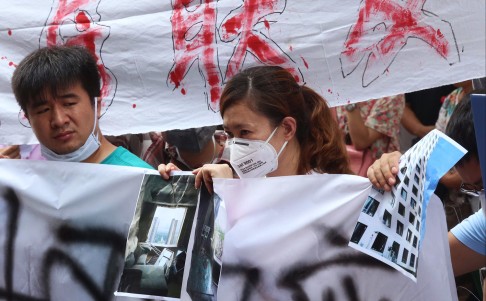
Homeowners want the government to buy their damaged homes. Photo: SCMP Pictures
Homeowners from the area had staged a demonstration on Sunday and inspired others to do the same today, protesters said.

Damage to a home near the blast site. Photo: SCMP Pictures
A separate opinion piece also published in Monday’s People’s Daily said the authorities could have better handled questions raised by the disaster.
In one example, rumours surfaced that the general manager of Ruihai International Logistics, Zhi Feng, was the son of a former vice mayor of Tianjin. This was later proved to be untrue, the article said.
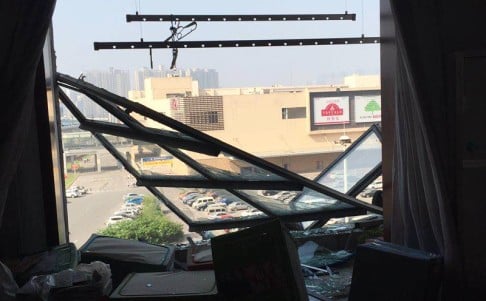
A window of an apartment blown out by the force of the blasts in Tianjin. Photo: SCMP Pictures
The Beijing News reported on Monday that a man surnamed Dong, was a shareholder in Ruihai.
The newspaper said Dong’s father was a former police chief in Tianjin port where the warehouse was located. He died last year from cancer.
The younger Dong has been arrested by the police, according to the report.
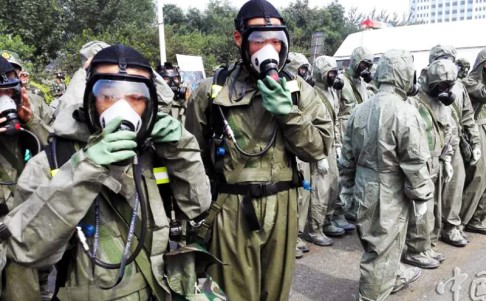
Military police join rescue workers deployed at the blasts site. Photo: SCMP Pictures
The firm had two major shareholders, The Beijing News said.
One called Li Liang, held a 55 per cent stake, and a civil servant in Tianjin, Shu Zheng, had the remainder, according to the report.
Shu told the financial news website Prism on Sunday that he had never been involved in the company’s operations, was unaware he had any link to the firm and that he had simply lent his identity card to a friend.
Tianjin blasts: Ruihai International Logistics under the microscope
A closer look at the operator of warehouse at the centre of massive explosions in Chinese port city
PUBLISHED : Monday, 17 August, 2015, 11:59pm
UPDATED : Monday, 17 August, 2015, 11:59pm

One of the two blasts that occurred at the warehouse operated by Ruihai International Logistics. Photo: XInhua
Name: Tianjin Dongjiang Port Ruihai International Logistics
Established: November, 2012
Registered: Tianjin Port Dongjiang Area of the China (Tianjin) Pilot Free-Trade Zone
Registered capital: 50 million yuan in 2012, changed to 100 million yuan (HK$121 million) in January
Business: Packing and unpacking dangerous goods, and the distribution, storage, transshipment, customs declaration and other services related to those goods, according to the firm's website. Ruihai was licensed to store dangerous chemicals only in 2014, official records said. It deals with hazardous chemicals such as sulphur, calcium carbide, nitrates, acids and toxic chemicals like sodium cyanide and toluene diisocyanate
Facilities: Two warehouses for dangerous goods, one transit warehouse, one container yard
Investors: Shu Zheng and Li Liang. Li served as legal representative until January
Current legal representative: Zhi Feng
The Beijing News reported Shu Zheng was not the true investor. Rather it was the son of a former police chief of the Tianjin port public security bureau
Sources: Tianjin Market and Quality Supervision Administration; company website, The Beijing News
- Joined
- Aug 29, 2008
- Messages
- 26,948
- Points
- 113
I know the place quite well. The Tianjin TEDA Binhai area was a place I made several work trips to last year. A colleague sent me a photo of the lobby of the hotel we always stayed at and it looked wrecked. The hotel was just beside the football stadium and around 5 km from the blast. Now the whole damn place has been cordoned off. Don't think I will be going back to visit my Tianjin customer is the next 10 years liao.....
- Joined
- Jul 25, 2008
- Messages
- 61,038
- Points
- 113
china is toxic. i rest my case.
Homeless Tianjin residents demand compensation, answers
AFP
August 17, 2015, 8:35 pm

Tianjin (China) (AFP) - Residents who fled their homes near vast and deadly explosions in the Chinese port city of Tianjin gathered in anger on Monday to demand redress from a government they say is ignoring their plight.
About 150 people, some with their faces scarred and many wearing protective breathing masks, descended on a hotel where government and military officials have been holding daily press briefings on the disaster.
"Buy back!," they shouted repeatedly and in unison, demanding compensation for their lost homes and belongings.
Many said they lived just 600 metres from the disaster, which struck Wednesday night and left a wide swathe of the area in ruins.
Liu Liang, a fashion designer who lives in a development called Harbour City, complained that residents were getting no answers from the government and being treated improperly.
He ran and left everything behind when the disaster struck, he told AFP, removing a bandage to show stitches near his left eye.
"The water, the air, the underground water are polluted," he said, voicing the fears of many.
"We can't live here," he added.
Despite their fury, the protestors attempted to show humility towards the authorities.
"Property owners of Harbour City: We love the Party, trust the government and plead for buyback," read a banner in white Chinese characters on a red background.
Some held small individual signs saying: "We resolutely demand government buyback.
Four officials who held a press conference in the hotel basement did not meet the protesters and left immediately afterwards.
Some of the demonstrators were focused on their families and health.
One woman, wearing a blue face mask, held a sign reading: "Dad, waiting for you to return home."
Another banner pleaded: "Give the children of Harbour City a clean future".
Police and other security, including SWAT teams and some in camouflage, stood by watching but no moves were made to stop the gathering, which dispersed after a few hours.
Demonstrations have become increasingly frequent in China in recent years over local issues such as pollution and corruption, but are more common in rural areas and second- and third-tier cities.
Authorities often tolerate them so long as they evince no signs that protesters are effectively organising beyond their own given locale, and do not make demands or criticisms of a political nature, such as condemning the ruling Communist Party.
Wen Jing, another participant, said she, her sister and their parents "ran away" from their 33rd-floor apartment on Wednesday night and are staying in a hotel for now.
"We can't go back to our home," she said, adding it was "totally" damaged.
She too expressed frustration with officials.
"They haven't spoken a word to us yet," she said.
"No one has noticed us yet. No one said anything to us."
Chinese Premier Li Keqiang visited Tianjin on Sunday to inspect the area, a common development after major disasters in the country, where top leaders are keen to show they are responding effectively. The visits are highly controlled and choreographed.
But Liu was not impressed. "No details, no details," he repeated.
What are the dangers of sodium cyanide?
PUBLISHED : Monday, 17 August, 2015, 11:50pm
UPDATED : Tuesday, 18 August, 2015, 12:07am
Naomi Ng
[email protected]

People injured in the Tianjin explosions protest on Monday outside a hotel where the authorities held a press conference. Photo: AFP
Chinese officials confirmed that "hundreds of tonnes" of highly poisonous sodium cyanide were being stored at a warehouse in Tianjin when it was hit by explosions last week.
What is sodium cyanide?
It's a form of cyanide and appears in a white crystalline form or granular powder. It is used in the manufacture of paper, textiles and plastics.
Why is sodium cyanide dangerous?
When it comes into contact with water or acid, it releases a highly toxic hydrogen cyanide gas, which can cause asphyxiation and be fatal in high doses.
How can you be exposed to sodium cyanide and what are the symptoms?
Through breathing, drinking water, or eating food that contains it or by absorbing it through the skin. Symptoms include a sore throat, headache, shortness of breath, convulsions and unconsciousness.
Your skin and eyes will feel irritated and appear red. If you swallow food or water that is contaminated with sodium cyanide, you could experience vomiting, diarrhoea and nausea.
What should you do if you come into contact with sodium cyanide?
Cyanide gas causes the most harm to humans if inhaled. You should quickly move to an open area to get as much fresh air possible. If breathing is difficult, oxygen should be supplied.
For serious cases of inhalation, tight clothing should be loosened and administration of oxygen becomes key. Avoid giving mouth-to-mouth resuscitation to an affected person as it can be hazardous.
Seek medical attention. Always remove and dispose of contaminated clothing.
Rinse your eyes with water for at least 15 minutes and remove contact lenses. Use soap and water to wash irritated skin and cover it with anti-bacterial cream.
What are the long-term health effects of cyanide exposure?
Serious cyanide poisoning can cause heart, brain and nerve damage.
Sources: US Centres for Disease Control and Prevention, International Programme on Chemical Safety
Without transparency, probe into Tianjin blasts will yield few answers
PUBLISHED : Tuesday, 18 August, 2015, 2:14am
UPDATED : Tuesday, 18 August, 2015, 2:14am
SCMP Editorial

Without transparency, probe into Tianjin blasts will yield few answers
Premier Li Keqiang's pledge to investigate the explosions that devastated Tianjin with the loss of so many lives, and to punish those guilty of dereliction of duty, are commendable. But they are a textbook response to one of the worst examples of a dismal record of industrial safety that exacts a terrible price for China's economic progress. Ultimately more important is his promise of "open and transparent information disclosure". On past experience that is not to be taken for granted amid a culture of opacity and secrecy that all too often serves official and vested interests. But it is paramount that an investigation reveals without fear or favour all the circumstances of the disaster.
Only then can the investigation comply with President Xi Jinping's direction for handling the aftermath - that lessons should be learned and that leaders at all levels must place work safety at the top of their agendas.
More than five days after the explosions, followed by a conflagration that destroyed part of the storage area in Tianjin's port, rumours and questions about the causes and background abound, but there are few answers. Indeed, it seems officials have devoted more time to tracking down rumour-mongers than searching for and revealing the truth.
Reports that hundreds of tonnes of highly poisonous sodium cyanide were stored at a warehouse, quickly removed from a state media website soon after the blasts, have now been confirmed. It is common knowledge how dangerous the chemical can be, especially when large shipments are constantly being delivered, warehoused and shipped. So many basic questions about the operation remain unanswered, even down to the amounts stored. Why and under what conditions was the company that took delivery of the cyanide at the warehouse allowed to handle a huge volume in such a location? Why were homes built within 600 metres instead of the minimum of 1,000 metres stipulated in regulations? In this regard, what steps were taken to mitigate the risk? Last, but far from least, what is the environmental aftermath? Already, environmentalists are warning it is much worse than reported.
The textbook response of a nationwide safety check on these kinds of hazards may be under way. But that, and punishment of those held to account, are not enough. The authorities must get to the bottom of what happened, learn the lessons from it and implement them - openly and transparently.
- Joined
- Nov 3, 2014
- Messages
- 119
- Points
- 0
From proud homeowner to the front line of protests over flats damaged in Tianjin blasts
Residents whose homes have been damaged are considering lawsuit against warehouse operator and property developers
PUBLISHED : Monday, 17 August, 2015, 11:50pm
UPDATED : Tuesday, 18 August, 2015, 2:32am
Keira Lu Huang in Tianjin
[email protected]

Residents whose homes were damaged in the blasts protest outside the hotel where the authorities hold a daily press conference on the relief efforts. Photo: K.Y. Cheng
If it was not for the deadly blast that severely damaged the first flat he bought, Mr Lu, an entrepreneur in his 30s, never would have thought he would be standing among protesters petitioning the government.
"We can't stand this anymore. I have a home but can't go back. I have a three-year-old daughter who was scared to death when the blast happened," said Lu yesterday, outside the venue for the daily press conference on relief efforts. "But the government hasn't helped us at all."
In 2010, Lu bought his flat at Vanke's Jinyu Lanwan, a European-style residential complex, at a cost of 14,000 yuan (HK$17,000) per square metre.
"In principle, we should negotiate with the developer, but in this case, I don't think they can do anything," said Lu, echoed by others. "The problem here is the loopholes in the government's regulation. Who stamped that government approval?"
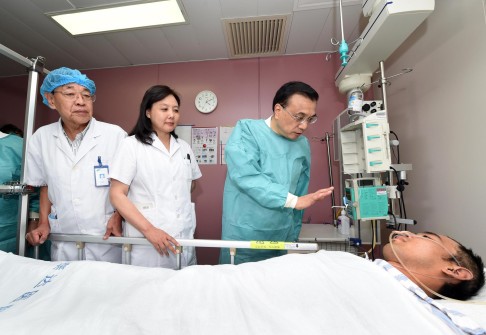
Premier Li Keqiang visits an injured firefighter in hospital. Photo: Xinhua
In the morning, more than 50 homeowners from four flat complexes near the blast site staged a second round of demonstrations outside the hotel that hosts the press conferences.
They called for the government to buy homes that had been destroyed or badly damaged.
Owners of property at Vanke's Harbour City shouted: "We want the truth!" and held banners that read: "We love the party and the government, please buy back our flats."
The demonstration lasted about three hours.
Some residents are considering further action.
Chen, a homeowner at Qihang Jiayuan, said the owners would jointly sue Ruihai International Logistics, which operated the warehouse at the centre of the blasts.
"I've consulted lawyers in Beijing and talked to other owners. We will do this together," he said.
After six days of waiting, Lu had also decided that if the government failed to help, he would consult a lawyer.
"Now it depends on the government's move," said Lu.
Vanke, China's largest property developer, said 5,200 units at three of its projects were affected by the blasts.
Harbour City was the closest complex to the explosion site. Its residents said it was hard for them to move back even though they were told the buildings would be repaired. Many haven't returned home since the blasts.
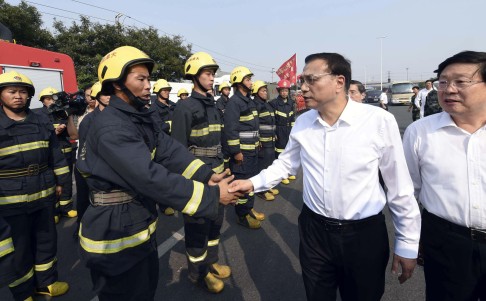
Premier Li Keqiang meets firemen working at the blast site. Photo: AP
Residents who have returned said they were offered 2,000 yuan a month for three months as compensation, but few took it as they feared it would make them ineligible for further payouts.
"We don't know what kind of toxic materials are left in the area, or if the building will be safe enough after the explosion," said Wu Jun, a Harbour City homeowner.
Protesters said residents were mainly young parents with children and seniors. Facilities nearby had attracted many to buy.
"We were told there was a shopping mall, schools, banks, everything, but [not] warehouses storing dangerous chemicals," said Wang Zhiguo, 31, from Shandong , whose wife and mother were injured in the explosions. He has no place to stay but in the hospital with his wife.
While Wang still held hope in the government, others had decided to sue the owner of the dangerous goods warehouse and the developers of their homes.
"We'd like to sue the government, but I understand that it's impossible in China," Wu said.
'Mum, it exploded... I can’t find dad': Boy recalls moment his father disappeared during Tianjin blasts
Father pushed his son under a fire truck to protect him after warehouse explosion
PUBLISHED : Monday, 17 August, 2015, 2:29pm
UPDATED : Monday, 17 August, 2015, 4:01pm
Kathy Gao
[email protected]

Fire crews at the scene of the explosions on Monday. Photo: Xinhua
A boy has described the moments before his father disappeared during the huge explosions at the dangerous goods warehouse in Tianjin last week.
The boy’s father, Zhang Hui, was a driver for a transport company at the city port and the pair was driving for supper after work when the first explosion happened on Wednesday night, The Beijing News reported, citing a relative of the missing man.
After the first blast at the port the father pushed the 13-year-old underneath him in their car, the report said.
There was another explosion and the father pushed his son out of the vehicle and under a nearby fire truck.
After the explosions had died down the boy crawled out from under the truck, bloodied and bruised, but his father was nowhere to be seen, the report said.
He borrowed a mobile phone and rang his mother.
“Mum, it exploded. I can’t find dad. Dad disappeared in the blasts,” he was quoted as saying.
Zhang originally came from eastern Shandong province and had been working at the port for seven years, according to the report.
His son lived with his wife in his hometown and had come to visit him for the summer holidays.
The boy was treated in hospital for his injuries. There is still no word on his father, the article said.
Alibaba billionaire Jack Ma attacked online for not donating money to victims of Tianjin blast
PUBLISHED : Monday, 17 August, 2015, 2:53pm
UPDATED : Monday, 17 August, 2015, 3:58pm
Coco Feng
[email protected]

Alibaba founder Jack Ma Yun has been criticised online for not donating to help the victims of the Tianjin explosion. Photo: Reuters
China's second richest man, Alibaba founder and chairman Jack Ma Yun, has come under fire online for not donating money following an explosion in Tianjin last week that killed more than 100 people.
Chinese business leaders and celebrities have rallied to donate money to support the rescue efforts. Hong Kong film star Jackie Chan was among the first to donate, pledging 3 million yuan (US$468,000) the day after the disaster. Richard Liu Qiangdong, founder and chief executive of Alibaba-rival JD.com, also donated 10 million yuan on Sunday.
After it was pointed out online that Ma had not announced any intention to donate money, his Weibo account was flooded by tens of thousands of critical comments.
"If you don't donate, I will stop shopping on Taobao," one commenter wrote.
"You threw away more than 1 billion yuan to buy a villa in Hong Kong, why not spend a few hundred million yuan for Tianjin victims," another said, referring to Ma's reported purchase of 22 Barker Road.
While some denounced those who criticised Ma, saying he had the right to decide where his own money went, the majority of comments called for him to donate.
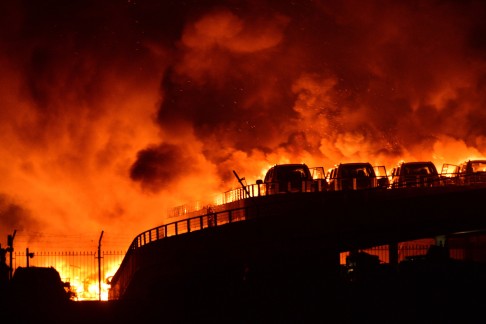
Fires burn in Tianjin, China following a massive explosion at a chemical warehouse that killed more than 100 people. Photo: Xinhua
Other Chinese internet leaders, including Pony Ma Huateng, founder and chief executive of Tencent, and Xiaomi boss Lei Jun, have also been criticised. But none came under fire as much as Ma.
Ma, who has an estimated fortune of US$31.5 billion, is the second richest man in China, and one of the country's top philanthropist, donating more than 14.6 billion yuan (US$2.3 billion) in 2014, according to the Hurun Report.
The Alibaba founder was quick to donate in the wake of previous disasters. Ma's firm pledged 25 million yuan (US$3.9 million) to help victims of the 2008 Sichuan earthquake, while in 2011 his foundation donated 5 million yuan following another disaster in the province.
Ma has not yet publicly responded to the Tianjin criticism.
His is not the only donation controversy. On Sunday, a 19-year-old girl was detained by police for allegedly obtaining tens of thousands of yuan from supporters after she falsely claimed her father had been killed in the Tianjin blast.
- Joined
- Jun 7, 2015
- Messages
- 2,364
- Points
- 0
end of the world is near
from china to Bangkok
the evil of men
the greed of men
will be demolished
together with the explosions
repent repent repent
from china to Bangkok
the evil of men
the greed of men
will be demolished
together with the explosions
repent repent repent
China's work safety chief detained for alleged graft in midst of Tianjin blast fallout
Investigation comes as the city remembers those who lost their lives in tragedy
PUBLISHED : Tuesday, 18 August, 2015, 11:41pm
UPDATED : Tuesday, 18 August, 2015, 11:51pm
Zhuang Pinghui, Li Jing, and Jun Mai in Tianjin

A mourner pay respects at a ceremony in a Binhai New Area park. Photo: Xinhua
The mainland's top work safety official, who was overseeing the emergency response to the Tianjin blasts, was put under investigation for alleged corruption on Tuesday. But it was not clear if his detention was linked to the explosions that killed at least 114 people in the port city.
The website of the graft-busting agency, the Central Commission for Discipline Inspection, said Yang Dongliang, head of the State Administration of Work Safety, was suspected of "violations of party discipline and the law", a euphemism for graft.
The news came as a shock to many as Yang, a former deputy mayor of the city, had been overseeing the rescue efforts since the blasts last Wednesday. On Monday he attended a meeting of the State Council's rescue task force.
Meanwhile, mainland media revealed 10 controllers and executives of Ruihai International Logistics, the operator of the warehouse where the blasts occurred, had been in police detention since last Thursday.
Read more: Tears as Tianjin mourns victims of warehouse blasts in commemoration ceremonies across city
Among those detained were Yu Xuewei, a former senior executive of Sinochem Tianjin, and Dong Shexuan, son of the former head of Tianjin Port Public Security Bureau, Caijing reported.
Ruihai's temporary permit to handle hazardous chemicals had expired in October 2014, and it did not obtain another permit until June this year, mainland media reported.
The probe into Yang, who built his career in petrochemicals and spent 12 years as a deputy mayor in Tianjin, might not be linked to the blasts.
Mainland media said the investigation might instead be related to the loss of state assets in the city. Yang had been the head of the city's state-owned assets administration for five years. Inspection teams from the CCDI have not yet covered the work safety administration.
The developments came as residents, firefighters, police and some officials gathered at sites in the Binhai New Area to remember those killed - carrying out a traditional ritual in marking the seventh day following a death.
The authorities are yet to announce the cause of the blast and hazardous chemicals still need to be removed from the site.
Some journalists and residents said they received skin burns after rain began to fall heavily at 10am. Experts have warned residents to stay away, fearing the rain could cause dangerous chemical reactions.
Bao Jingling, chief engineer of the Tianjin Environmental Protection Bureau, said air quality would be closely monitored, but added, "the best way [to be safe] is to stay far away from the site".
Angry homeowners braved the rain to protest outside a venue used for media briefings.
They demanded compensation and asked the government to buy back flats damaged in the blasts.
The State Council yesterday set up a task force to investigate the incident. It will be led by Vice-Minister of Public Security Yang Huanning.
Wang Hongwei, a professor at Renmin University, expected more people would be investigated. He said the incident was "unprecedented" and that any official implicated, no matter how senior, would be punished.
Mounting questions prove test of leadership
PUBLISHED : Wednesday, 19 August, 2015, 3:18am
UPDATED : Wednesday, 19 August, 2015, 3:18am
Cary Huang
[email protected]

Premier Li Keqiang (second from left) visits the blast site on Sunday. Photo: Reuters
The twin explosions that convulsed Tianjin have not only taken more than a hundred people's lives - they have dealt a political blow to the leadership under Communist Party chief and President Xi Jinping and Premier Li Keqiang .
Horror over the disaster at a chemical storage site in the northeastern metropolis last Wednesday has turned to public anger over a perceived government failure to handle the crisis.
"It is definitely the biggest political blow [yet] to the Xi-Li administration as the blasts exposed deep-rooted flaws in a political system that the new leadership had refused to address and their failure in handling the aftermath," said Zhang Lifan , a Beijing-based political commentator.
Xigen Li, an associate professor at City University of Hong Kong's department of media and communications, said the unprecedented scale of the disaster made it a challenge for the government to respond promptly.
The leadership faces growing public outrage over the blasts, as people seek answers to a series of questions.
Were workers at the facility owned by Ruihai International Logistics properly trained? Were firefighters properly informed about the nature of the fire before they arrived at the scene? Is the city's air safe to breathe and is its water drinkable?
People have also been disappointed at the delayed reporting of the explosion by the government and state-run media.
Steve Tsang, a senior fellow at the China Policy Institute at the University of Nottingham, said the government was managing the disaster response unwisely.
Tsang pointed to two issues, with the first concerning the cause of the explosion and the firefighters' tactics. "This was badly handled, but we do not actually know how or why the explosions happened and do not know what extent was the result of government failure, if any."
The second issue concerned the government's efforts to suppress reporting in a situation where public health could be at risk.
"If [public health problems arise] people will blame the government, and it will cause grave damage to the credibility of the government and the top leadership," Tsang said.
Not only are nearby residents angry over being kept in the dark about what was stored in the warehouses, family members of the firefighters who died are asking whether they were sent to the scene unaware there was a chemical fire.
"People want explanations," said Laurence Brahm, a Beijing-based political commentator.
The general statements by the leadership had failed to answer specific questions, Brahm said. "People are asking for news to be timely and complete. They want answers."
Xigen Li, of City University, said officials were moving slowly due to the complexity of the situation, which included security measures for dangerous goods sites and the pursuit of profit by powerful crony groups at the cost of public interest.
Warren Sun, a professor of Chinese politics at Monash University in Australia, said the tragedy further exposed long-standing collusion between party officials and self-serving businesses, which had eroded the strength of government regulations.
"It opens a can of worms and could prompt further readjustment of China's economic development model," Sun said.
Zhang said the new administration had shown little interest in long-stalled political reform as it had focused on an anti-corruption campaign to weed out opponents since coming into office in late 2012. "The explosions have exposed the flaws in its political system and thus slapped the face of a politically conservative leadership," Zhang said.
Some people on the mainland were also angered by the delayed appearance of top leaders at the scene of the disaster. Xi has yet to show up and Li made his visit on Sunday. Li's predecessor, Wen Jiabao , often rushed to the site of disasters in an effort to reassure the public.
A deputy mayor in charge of industrial safety was the most senior municipal official to answer questions in public since the disaster when he attended a press conference on Monday.
Tsang said Li and Xi were missing opportunities to demonstrate their concern. Sun noted that Tianjin neighboured Beijing and Beidaihe , where leaders were believed to have been gathering in recent weeks, but it took days for Li to show up.
"This disturbing fact does seem to suggest that some other political agenda had been preoccupying the top leadership in the past week, such as a personnel reshuffle or reform of the military, matters of much higher priority than the crisis management of the Tianjin explosion," Sun said.
Brahm said there was a political undercurrent to the official response that needed to play out.
"The leadership is apparently deliberating on the bigger picture of the political - rather than the chemical - fallout before establishing what should be reported as fact and what not," he said, adding the blast had become a stage prop in the theatre of Beijing's unfolding political saga.
How the government conducts its investigation and the amount of transparency it permits into the process, the expediency with which findings are conveyed, and its willingness to expose powerful people, if necessary, will be a test of the leadership's pledges to deliver justice.
Similar threads
- Replies
- 30
- Views
- 1K
- Replies
- 1
- Views
- 342
- Replies
- 1
- Views
- 83
- Replies
- 0
- Views
- 228
- Replies
- 1
- Views
- 402

